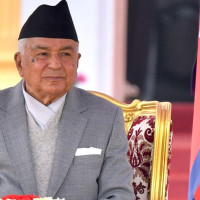- Tuesday, 3 March 2026
USAID, Deep State And Trump Tremors
The United States of America is undergoing a seismic shift under its new President Donald Trump. His series of executive orders has/have rattled both allies and adversaries alike. These sweeping policies seek to overcome internal crises precipitated by the so-called global liberal order. Low growth, lingering recession, rising debt and unemployment, among others, have weakened the US internally. Despite its status as the sole superpower of the world, its military supremacy was dented by none other than the Taliban in Afghanistan. It has been pumping billions of dollars into Ukraine to fight against Russia. But, Ukraine has already lost vast swathes of land to Russia. It is almost an unwinnable war for Ukraine which is involved in the battles with the money and weapons of US and European backers.
With already in $36.22 trillion national debt, the US has become an ‘overstretched empire,’ unable to sustain its global hegemony through its current policies. Trump's initiatives to restructure the US institutions should be seen from this perspective. On the face of it, Trump’s strategies appear to be uber-expansionist despite the suspension of aid to various nations. But his policies are driven by national interest, and a sense of realism to some extent.
Positive response
His determination to dismantle the ‘deep state’ has received positive responses from those who are, in principle, opposed to the US’s hegemonic role across the globe. The Trump administration has imposed a 90-day moratorium on all US foreign assistance funded by or through the State Department and US Agency for International Development (USAID). It has initiated a review to realign all foreign assistance programmes to make sure that they correspond to its policy under the ‘America First agenda. “The United States is no longer going to blindly dole out money with no return for the American people,” said Trump.
The maverick President has heavily criticised the USAID, accusing it of being run by radical lunatics, fraudulently spending money and infested with corruption at all levels. Elon Musk, who now heads the new Department of Government Effectiveness (DOGE), has called the US aid agency a ‘criminal organisation’ and handed it over to the State Department. With about $70 billion annual budget, the USAID is the global instrument of the US’s soft power but critics insist that it has been used to spread the ‘tentacles of the deep state,’ destabilise nations and oust the regimes abroad. The new administration plans to cut the agency’s employees from over 10,000 to 290.
The term ‘deep state’ has gained ground again with Trump’s second presidency. It is a state within a state. Merriam-Webster dictionary defines the deep state as an ‘alleged secret network of especially nonelected government officials and sometimes private entities (as in the financial services and defence industries) operating extralegally to influence and enact government policy.’ For Trump, ‘deep state’ means those officials who prevent him from making ‘America great again.’ With the disclosures of USAID funding, its credibility has suffered a setback. It allocated $15 million to purchase condoms for Taliban, $446,000 to promote atheism in Nepal, $17,000 to a transgender-themed opera in Colombia and $20,600 for drag shows as part of an LGBTQ cultural opera in Ecuador.
Talking at the Megyn Kelly show, US Secretary of State Marco Rubio disclosed that out of every dollar sent to USAID, only 12.5 cents reached the final recipients and the rest of the funds were spent on ‘financing bureaucratic organisations.’ This implies that most of the grant amount is spent on the process, with NGO/INGO officials in recipient countries amassing fortunes. This will give rise to what BP Koirala said the ‘rootless class’ that thrives on foreign aid and assistance.
However, USAID also spends money on poverty alleviation, environment, healthcare and disaster management through different NGOs and INGOs, benefitting many people in different countries. But detractors argue that this noble cause served as a subterfuge to prepare critical masses comprising academics, journalists, bureaucrats, NGOs, and INGOs workers mobilised for oppositional politics against the regimes undesirable to the ‘deep state’.
Meanwhile, USAID's funding to promote atheism in Nepal has triggered an uproar, with social media users discrediting those involved in it. Last March, Republican Congressman Brian Mast made public this fact while grilling Richard R Verma, Deputy Secretary of State for Management and Resources in the Biden administration. Mast stated that the department’s ‘grant request’ document mentioned that it gave money to “promote atheism in Nepal”. He had posed a question: “Would it be appropriate for the (US) State Department to authorise half a million dollar grant from American taxpayers' money to promote atheism.” Verma replied that it would not be appropriate to allocate a grant to promote any religion or non-religion coming from the United States. However, he denied that any grant had been provided for atheism in Nepal or divided up into other areas.
Atheism
Generally, the term 'atheism' is a Marxist lexicon. Based on Marx's theory of dialectical materialism, communists negate the existence of god in the world. The US is not expected to produce masses of Marxist believers in Nepal. What atheism means here is to proselytise people into a religion other than their own. In Nepal, atheism denotes conversion to Christianity, targeting the poor, marginalised and minorities, which is against the national laws and constitution.
In yet another report, the new US administration has suspended $39 million in aid to Nepal's federalism and biodiversity. The US's financial support for biodiversity helps fight climate change, and there is little objection to such funding. However, foreign grants to institutionalise federalism have raised the eyebrows of many. In the past, the country had already received loans and aid from the World Bank for the same purpose. The continuous foreign aid to oil the wheels of federalism does give ammunition to the anti-federalist forces intent on dismantling it. This has emboldened them to argue that federalism is an imported system and Nepal can no longer sustain it. The suspension of US aid to Nepal offers both challenges and opportunities. Nepal must learn to stand on its own feet and reduce its foreign aid which only increases dependency and weakens national capacity and sovereignty.
(The author is Deputy Executive Editor of this daily.)
















